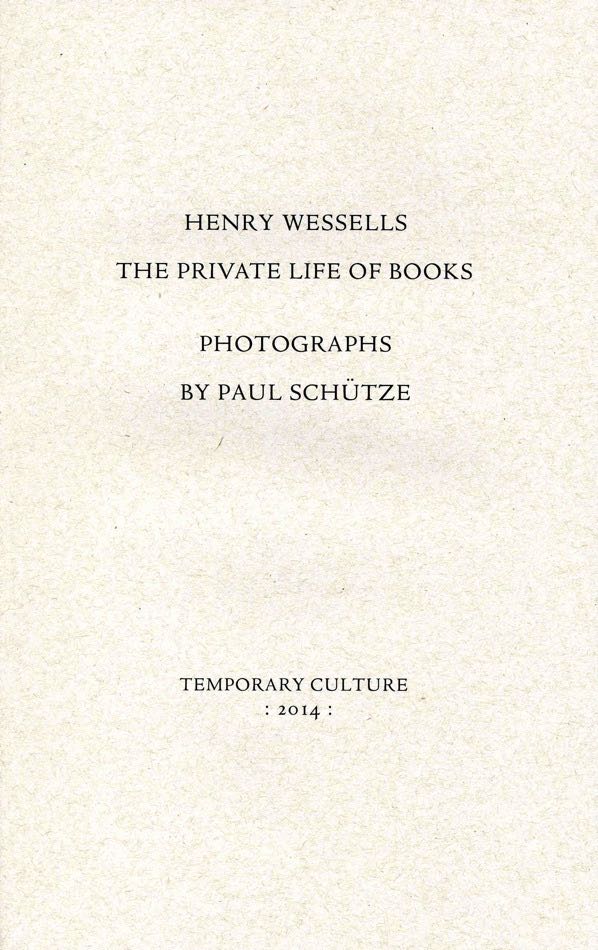
September - November 2014

2 November 2014
burning down the house
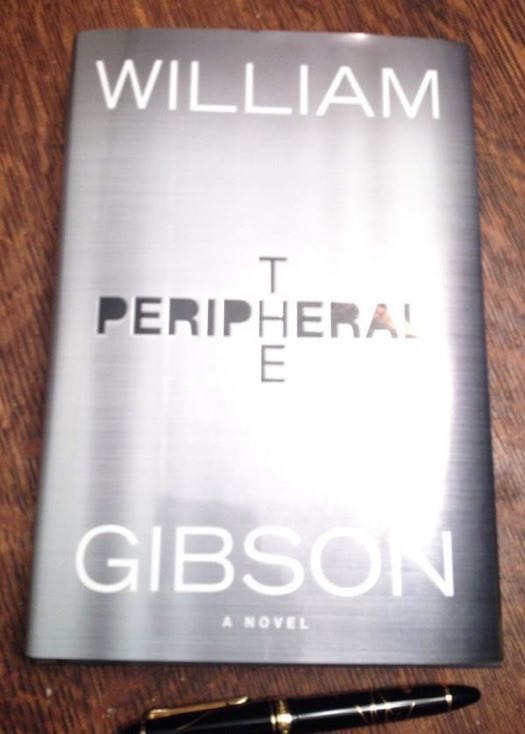
— William Gibson. The Peripheral. G.P. Putnam’s Sons, [2014]. This is a short notice rather than a full review because you should just go read the book and then we can talk. Like all good literature of the fantastic, The Peripheral is a mirror. Notionally occurring along two timelines, the continuum of Flynne Fisher and her tribe, sometime post-2026 in the American south, and in Wilf Netherton’s London maybe seventy years thereafter, Gibson charts inequalities in the distribution of information and wealth that are fully present right now ; and describes an ecological disaster from both sides of the cataclysm. The plot is supple enough, and seeds planted early bear nicely ripened fruit ; but it is the dance of language on the page that held my eye and ear. The words are tasty, the sentences delight ; the neologisms, names of corporations, and repurposed words are integrated into the lives and speech of the characters. I don’t suppose I will ever use the word singularity again, except perhaps in a narrowly descriptive sense, for Gibson has pulled a term from the other side of the event that both embodies history re-written by the victors and critiques those assumptions. I am still pondering the energy requirements and other consequences of certain processes that are mere commonplaces to the future Londoners. From the first page, Flynne really is up for anything the universe throws at her ; the awakening of Netherton’s humanity is rather more gradual.
“ It mostly makes its own kind of sense, then you hit something that seems impossible, or just completely wrong, and she either explains it or tells you to ignore it. ”
The fabric of daily life in the novel seems weird but lived-in, “ The ordinary sad-ass humanness of his story [. . .] in spite of big lumps of future-stuff ” ; there is the best two-sentence description of R’lyeh ever ; good aphorisms and choice phrases abound (and allusions along a very wide spectrum) ; there are some vertiginous moments, and page 316 is just flat-out hilarious. It is a very dark mirror, and the resolution of the main narrative tensions dispels none of that darkness. The last three chapters form a coda that is almost, aw shucks, sweet.
Gibson makes it happen.
— — — —
‘ a surface of chaos and a tantalising depth of incalculable value ’ ; or, recent reading

— John Shire. Bookends. A Partial History of the Book Trade in Brighton. Invocations Press, [2011]. With map. What might seem at first glance to be a small provincial topic is made fascinating by wit and the play of language.
“ The degradation of books has a long and illustrious history. ”
Shire chronicles the people and shops of the Brighton book world from the days of lending libraries and the dispersed (i.e., unagglomerated) nature of Victorian publishing up though the present. The first illustrated stamp collecting guide and Moon type for the blind (a long-time rival to Braille) both originated here. Bookends is also a social history of Brighton, noting how the town establishments did not always share the openness of the booksellers to alternative thought or ways of life. The chapter on Bill Butler and the Unicorn Book Shop is essential reading for understanding poetry publishing in the 1960s — and science fiction. Butler produced the chapbook version of Ballard’s obscene encomium to Ronald Reagan (1968), one of the books seized by the Brighton police during a raid on the shop, and prosecuted in one of the very last obscenity proceedings. Shire tells of the he pleasures and perils of book scouting with doleful glee and considerable irony. Shire rates high on the intensity scale, within three pages he has already inserted H.P. Lovecraft into the narrative (see next), and he knows how to sneak an astonishing sentence into a paragraph to keep the reader alert and engaged. Such an interesting town, such a good little book.
— — — —
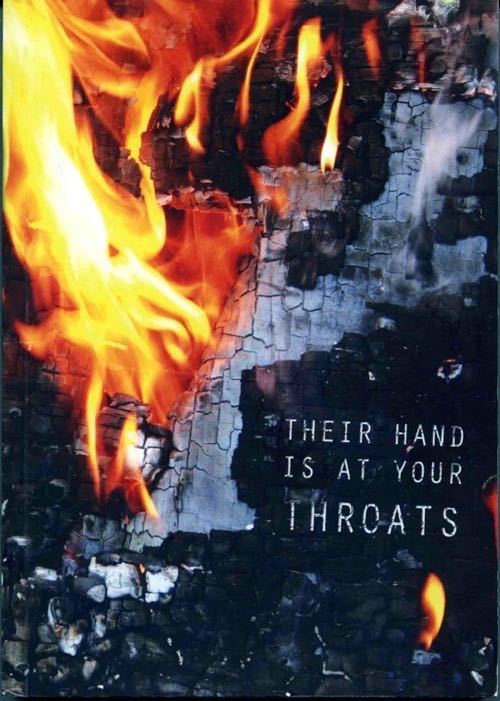
— John Shire. Their Hand Is at Your Throats. Invocations Press, [2013]. “ For almost thirty years I have been trapped in the orbit of a vast dead star named Lovecraft ” (from the Preface . . . Stories after Lovecraft). Succinctly stated. These are Lovecraftian critical fictions, collisions of books such as Bayonets to Lhasa, The Bride of Science, The Tartar Khan’s Englishman, and Arktos, with At the Mountains of Madness and other elements of the work of Lovecraft. Not suitable for all audiences but very, very good.
— Lawrence Clark Powell. Fortune & Friendship. An Autobiography. R.R. Bowker, 1968. “ Books remain. [. . .] awaiting the touch of hand, the sight of eye that brings them to life. It may be that some of them will have a long wait before they are found by a curious or needful reader. ”
— Jules Feiffer. Kill My Mother. A Graphic Novel. Liveright Publishing, [2014]. Stylish drawings, a retro imprint suitable for a strong beginning section rooted in 1933 that kicks some fresh air into the noir motifs, and very good allusions to Chandler ; but the story did not hold together, ultimately, in the later sections set in wartime and after.
— — — —
current reading
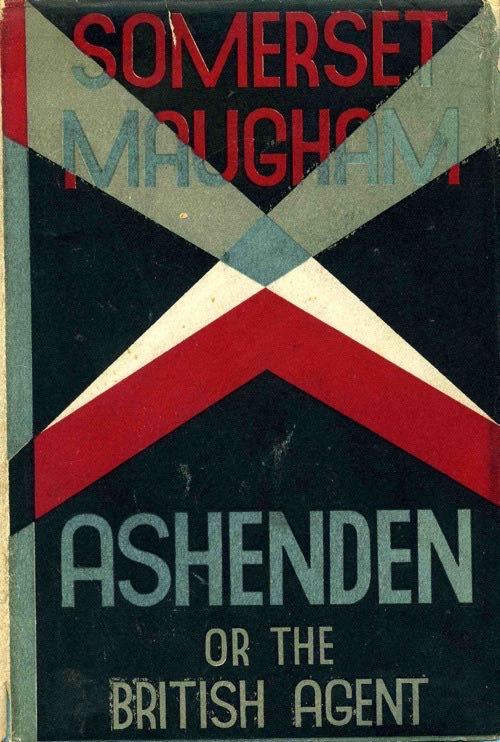
— W. Somerset Maugham. Ashenden or The British Agent. William Heinemann, 1928. Back panel of the dust jacket above.
— Twelve Tomorrows. [Edited by Bruce Sterling] [Cover title: MIT Technology Review SF Annual 2014. Twelve Tomorrows]. [Cambbridge : Technology Review, 2014]. Anthology of original fiction by Lauren Beukes, Chris Brown, Pat Cadigan, Cory Doctorow, Warren Ellis, Joel Garreau, William Gibson (an excerpt from The Peripheral), Paul Graham Raven, Bruce Sterling ; an interview with Gene Wolfe ; a review of a new English translation of Lem’s Summa technologiae (1964) ; and a curiously retro-future selection of book and magazine covers by John Schoenherr (The Prophet of Dune, etc., chiefly 1964-1977).
— — — —
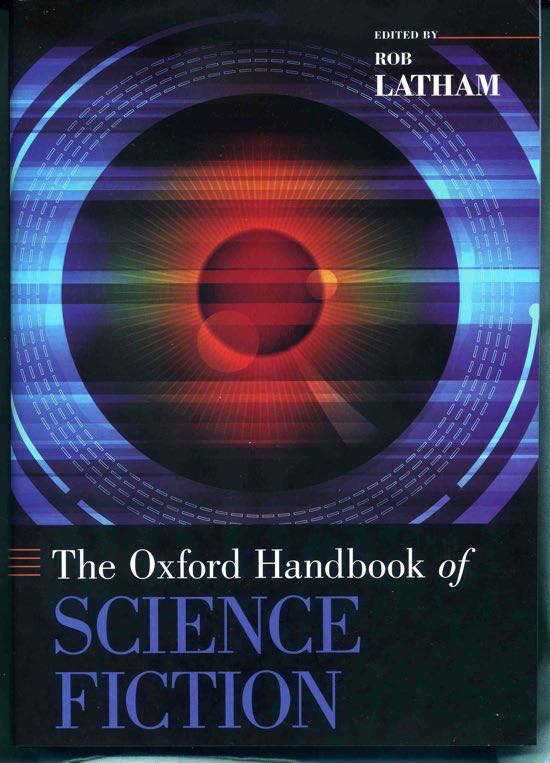
— The Oxford Handbook of Science Fiction. Edited by Rob Lethem. Oxford University Press, [2014]. xv, 620 pp. Dense and dull academic prose (citations obstructing the text rather than endnotes), crowded page composition (43 lines of text in a live area 47 picas in height) ; am hoping that the essay on the Gothic will prove worthwhile.
— Cyril Simsa. Lost Cartographies. Tales of Another Europe. Invocations Press, [2014]. [viii], 151 pp. Collection of six stories, “ my reports from the far side of our culture’s ambivalent European identity. From the weird germ-lines and the mapless demesnes on the left-hand side of the family. From Europe as Other and another Europe. ”
— — — —
Fire-Flies in Atlantis ; or, The Country of Fear
In the newly published issue 23 of Wormwood, for Autumn 2014, your correspondent’s essay “ Fire-Flies in Atlantis ; or, The Country of Fear ”, on re-reading Atlantida (L’Atlantide) by Pierre Benoît appears at pages 50 to 58 ; there is also an excellent review by Reggie Jackson of the two-volume history of supernatural fiction by S.T. Joshi, Unutterable Horror (2012), an account of a visit to New York City by Michael Dirda (and the tall pile of books he found), and reviews and essays on an eclectic mix of authors and titles in the literature of the fantastic, supernatural, and decadent. Published by Tartarus Press : http://tartaruspress.com/Wormwood23.htm.
— — — —
Boston Antiquarian Book Fair, 13-15 November
Your correspondent will be in Boston for the 36th Boston Antiquarian Book Fair, at the Hynes Center 14-16 November. James Cummins Bookseller will be exhibiting at booth 209. Come say hello. Please let me know if you would like a pass to the show. Copies of The Private Life of Books will be available (you may also order here).
— — — —
The Death of the Book Award : 2014
The Endless Bookshelf announces the 2014 Winner of The Death of the Book Award :
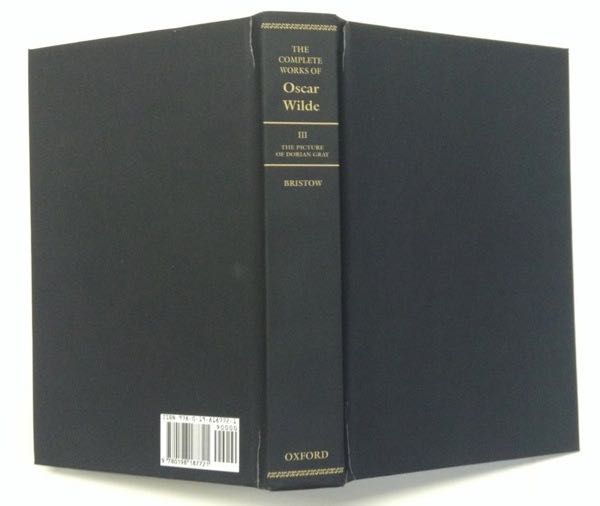
— The Complete Works of Oscar Wilde. General Editor : Ian Small. Volume 3. The Picture of Dorian Gray. The 1890 and 1891 Texts. Edited by Joseph Bristow. Oxford University Press, [2005 ; POD reprint, dated on terminal leaf 25 Sept. 2014]. Bound in brownish repellent silicon paper over boards, false gilt rules and titling on spine. Textblock stiffly glued and unopenable ; narrow margins, poorly reproduced illustrations. From the reports of the judges : “ it smells disgusting, too, oily synthetic hormones ”.
The Death of the Book Prize is awarded for the ugliest book issued from a publisher who should know better.
All art is at once surface and symbol. [. . .] All art is quite useless.
— Oscar Wilde, preface to The Picture of Dorian Gray, 1891.
The Endless Bookshelf has reviewed, noted, and consulted numerous books from the many branches of Oxford University Press. Those books are : often useful, well designed, substantial, and, sometimes, even beautiful. This book is supposed to be a volume in the definitive edition of the Collected Works of a world author, but it is an affront to the senses, an engineering failure, and a disservice to scholarship. What were they thinking ? Were they thinking ? Do the editors know that this has been done to the book ?
The late Reno W. Odlin coined the term “ paperback in drag ” to describe late twentieth-century industrial hardcovers. Nominations and coinages for the taxonomy of these zombie book objects are invited.
— — — —
recent reading :
— Anne Waldman. Manatee / Humanity. Penguin Poets, [2009].
— Tana French. The Secret Place. Viking, [2014]. “ But I was starting to see it, out of the corner of my eye : the shimmer in the air that says danger. ”
— — — —
21 September 2014

— Giovanbattista Braccelli. Bizzarie di varie Figure, 1624. [Facsimile edition, issued with :] Propos sur Braccelli par Tristan Tzara. L’Aventure d’ Livre et notes bibliographiques par Alain Brieux. Paris, 1963. With folding facsimile plate and census of the nine (9 !) known copies, only one of which is complete. I first learned of this astonishing book of engravings from a Brazilian artist. It remains curious and beautiful, one of those books that upset all notions of time. One can see why the surrealists and Dadaists esteemed it.
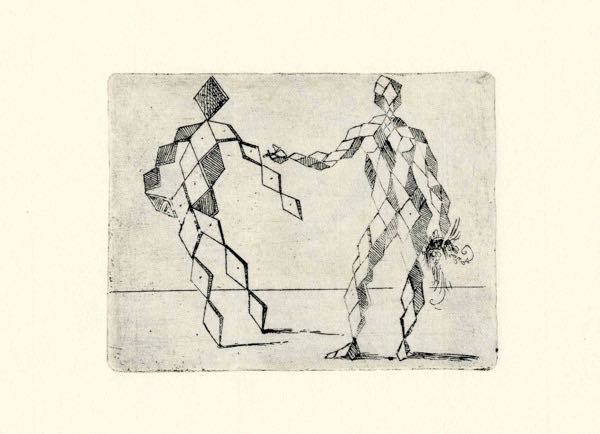
— — — —
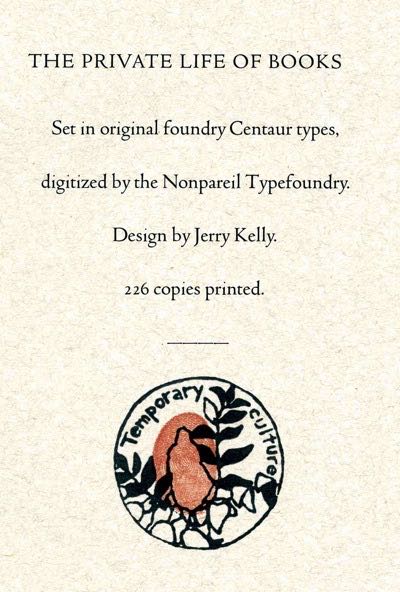
Monday evening, 15 September, was publication day
for The Private Life of Books, a book of poems by Henry Wessells
and photographs by Paul Schütze. Subscribers and readers and friends
gathered in celebration of the event, along with two other Temporary
Culture authors, Wendy Walker and
Michael Swanwick (whose account of the festivities is here).
Copies have been sent to subscribers. About half of the edition has been
distributed (detail of colophon above ; title page below).
Order here, http://avramdavidson.org/Privatelifeofbooks.html.
— — — —
‘ the imposition of another’s imagination ’ ; or, recent reading
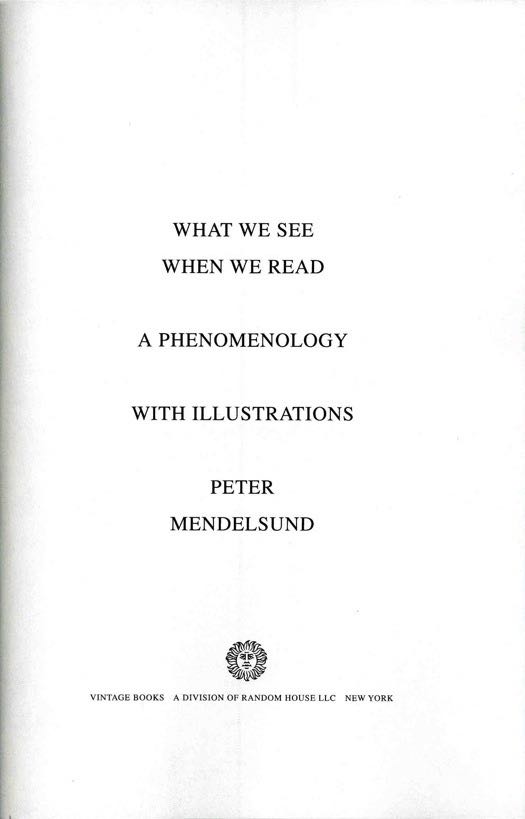
— Peter Mendelsund. What We See When We Read. A Phenomenology. With Illustrations. Vintage Books, [2014].
At first I asked myself, repeatedly, is this popcorn,
or pornography (or catnip) ?
What We See When We Read is a stylish book where form and function
are inseparable, an object that demands the reader play with the ideas
it expresses. It is an intellectual page-turner, as Mendelsund illustrates
and articulates a manner of cognition. There are some choice metaphors
and phrases : “ a load-bearing word ”, or “ words
potentiate meaning ”. It is pure delight to see Nabokov’s
annotations to the first page of Kafka’s “ The Metamorphosis ” in
English translation, with his quick, precise entomological drawing. And
one must pay attention, for the footnotes and asides are as sharp as
the text. While I agree with many of Mendelsund’s individual propositions,
and even with his notions of consciousness as “ imperfect ;
partial ; hazy ; co-creative ”, I often found myself
thinking, no ! in response to other ideas about reading and the
reader. The mark of an engaging book.
For your correspondent, the aim of a work of fiction is to cause the reader
to experience an effect. One reads not to see but to understand : the
nature of that understanding may include a feeling, or the memory of certain
images seen while reading, but it is not reducible to the feeling or even
divisible into the component images. (This is also why I feel that worries
about revealing plot turns are, in the end, irrelevant.)
I have not answered my question, but What We See When We Read will
go on the shelf near The Medium is the Massage (1967) and The
Self-Reflexive Page (2010).
— — — —
— William Plomer. Turbott Wolfe. Edited by Stephen Gray. Johannesburg : A.D. Donker, [1980]. Originally published in 1926 by the Hogarth Press of Virginia and Leonard Woolf, in a plain brown dust jacket (and the date 1925 on the title page).
“ those stranger winds that rise and lapse in the imagination, stirring with the slightest uneasy wings something that cannot reveal itself ”
— — — —
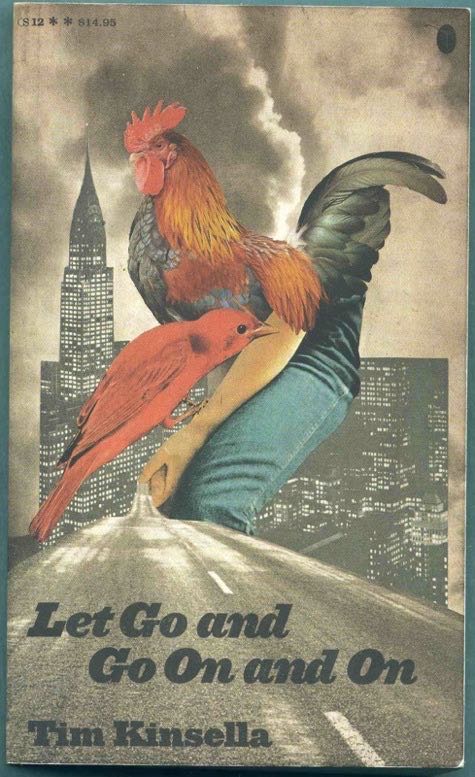
— Tim Kinsella. Let Go and Go on and on. A novel. Based on the roles of Laurie Bird. [Curbside Splendor, 2014].
The novel is that most resilient of literary forms : call any text of a certain length a novel, and it becomes a novel. Let Go and Go on and on is a critical fiction of 1970s America that takes as its source text four films : Two-Lane Blacktop, Cockfighter, Annie Hall, and Bad Timing. The aim is noble : to articulate a suppressed voice, to evoke an unknown person who may be seen as a casualty of the decade. Laurie Bird, “ the tragic starlet ”, committed suicide. “ Very little is known about her. ” The trajectory of this novel is fascinating, from the rural south to Los Angeles and a New York City penthouse. No one is more sympathetic to the potential of the critical fiction that I am. But that sympathy does to entail the abandonment of the principles of careful reading that are at the core of the attempt. And so I must report on the technical and philosophical issues this novel raises. Even an “ entertainment ” can be considered seriously.
Let Go and Go on and on recounts incidents from the plots and dialogues of the four films. Over time it becomes apparent that characters (actors) and lines are being braided to create a continuous consciousness. There are some interesting, well-turned passages :
All at once, you understand in your gut why fast cars are sexy.
The same gaze translates.
The same gaze considers a body at rest, its parts as parts, and how these parts all come together with unified intent, imagining the body’s performance.
All suspense.
All potential.
And yet. With a text so rooted in film, the question arises, to what degree is this simply coasting ? That is, relying upon shadows from elsewhere that are most emphatically not present in this text.
The choice of a second person singular narration is a perilous one in American letters. There are few successful examples at extended length. * The second person singular narration brings with it a certain sensory starvation, and as the prose unfolded, I kept asking myself, whose words are these ? Whose diction and vocabulary are being yoused. And then the reader comes to Part 4, where these issues can no longer be avoided. In the opening sentence of Part 4, an I asserts itself in First Person Singular Narration and the Paul Simon character from Bad Timing (transplanted from Vienna to New York City) takes the helm from the Second Person Singular Narration. The You form is not entirely abandoned, but it does not regain primacy until the final paragraphs of the book. What is a reader to make of this ? This narrative I (who is a creep) appears in part 4 and his voice asserts dominance over the You narrations which have hitherto shaped the consciousness of Let Go and Go on and on. What happened to Laurie Bird ?
A commendable experiment, though not entirely successful. Much better to have attempted it than not.
* Send me your candidates. I have not read it in years but I do not rank Bright Lights, Big City as a successful example. There I have said it.
— — — —
7 September 2014
recent reading
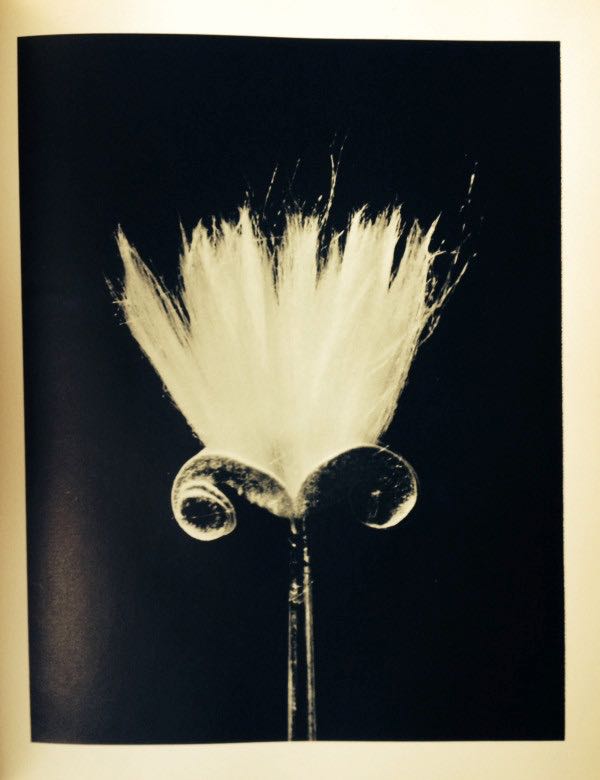
—Walter E. Rogers. Tree Flowers of Forest, Park, and Street. [Duotone plates from photographs by the Author]. The Drawings from Nature by Olga A. Smith. Appleton, Wisconsin : Published by the Author, 1935. A beautiful and fascinating book. “ That tree flowers are not well known is due primarily to the fact that they are seldom of large size and so do not attract attention to themselves as do the showier blossoms of the herbs found in our gardens, conservatories, and woodlands. ” (Above, the fruit of the willow.)
—William Plomer. Turbott Wolfe (1926). Edited by Stephen Gray. Johannesburg : A.D. Donker, [1980]. With essays and appreciations by Nadine Gordimer, Laurens van der Post, and others. Truly remarkable novel, a narrative of south African attitudes and people. Anti-apartheid before the emergence of apartheid. Wish I had read this when I was nineteen years old (the age at which the author wrote it).
“ Native question, indeed ! My good man, there is no native question. It isn’t a question. It’s an answer. ”
— — — —

—Adam Roberts. Adam Robots. Short Stories. [Gollancz, 2013]. Tricky stories, lots of fun (just started reading, picked this up at the Gollancz table at the World Science Fiction Convention).

— — — —
The Private Life of Books : publication day is 15 September, details here : http://avramdavidson.org/Privatelifeofbooks.html
— — — —
Mailbag Roulette : A Cumulation
Mailbag Roulette was invented at Readercon 2012 by your correspondent [HWW], together with [EK] and [MF], who are blameless. We each pulled a forthcoming book from the Temporary Culture mailbag and read an opening line. Your correspondent claimed the privilege of reading this one:
Reader, I am delivered of a son.
There was no turning back. Each wave of the publishing cycle brought new terrors ; and also patterns to be discerned. Readers will pardon the notes of exasperation, even desperation, that are sometimes to be seen in the captions : count yourself lucky that you did not have to experience these books at first-hand. The all-time winner remains Gluten for Punishment (mid-April 2013).
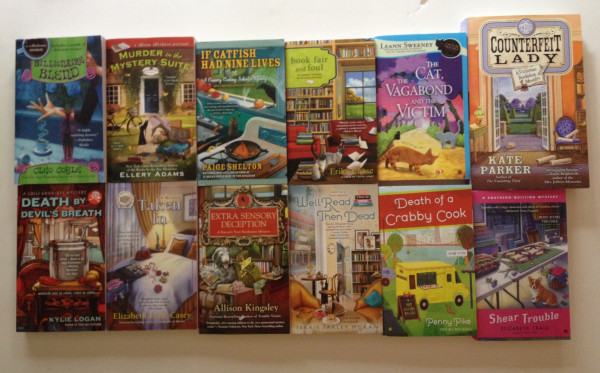
mailbag roulette (early summer) : 1 crow, 3 dogs, 5 cats ; If Catfish Had Nine Lives
— — — —
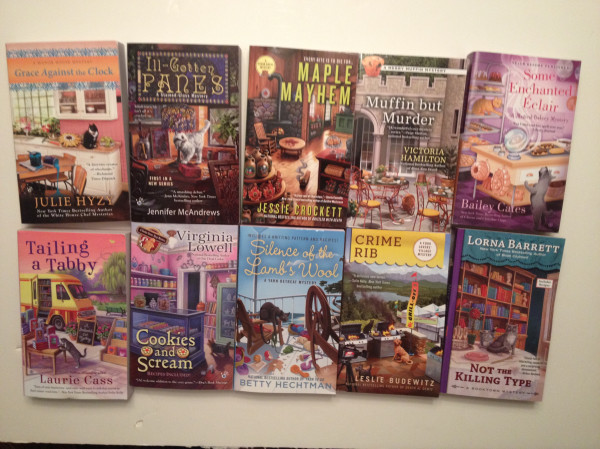
mailbag roulette, late spring : 7 cats, 4 dogs, “A Bookmobile Cat Mystery” [niched to death]
— — — —
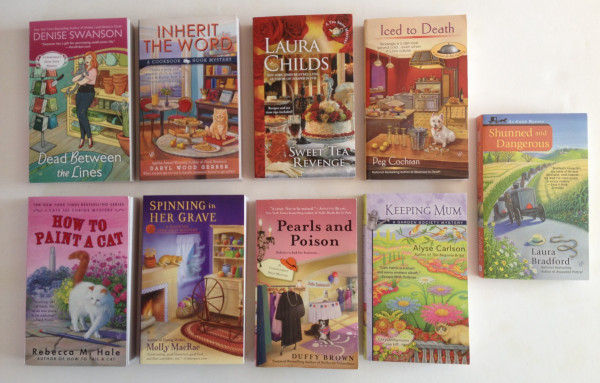
mailbox roulette (late Feb.) : cats 5, dogs 2 ; horses 6 receding [too much sugar …]
— — — —
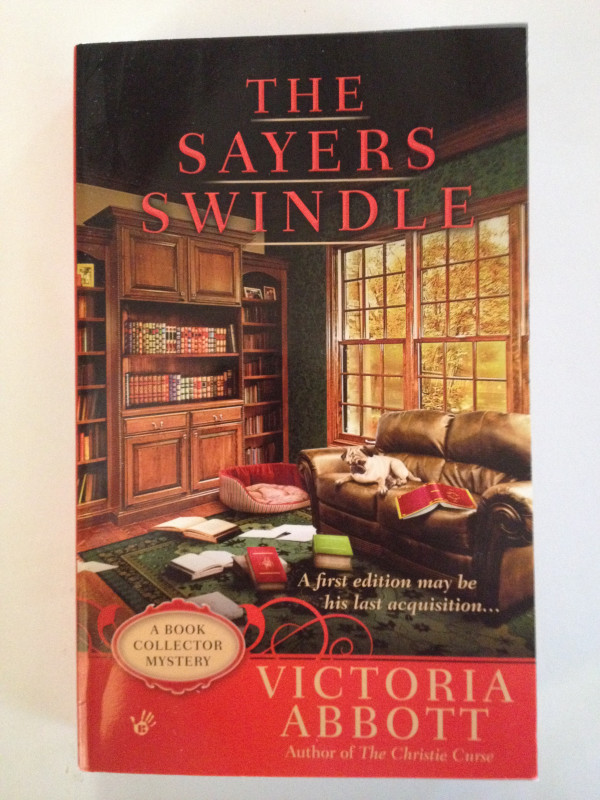
No, just no : the wrathful shade of Harriet Vane will
walk
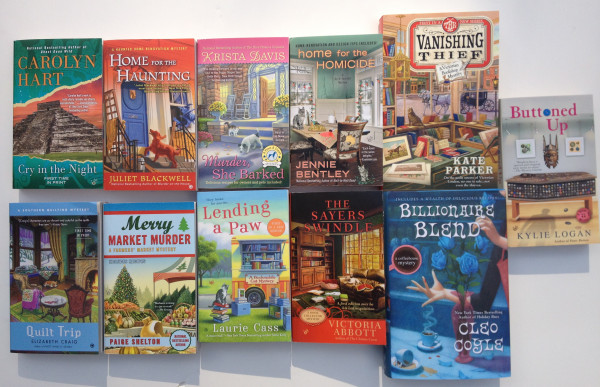
mailbag roulette (November 2013) : 4 dogs, 5 cats, A Bookmobile Cat Mystery [runs screaming into the forest]
— — — —
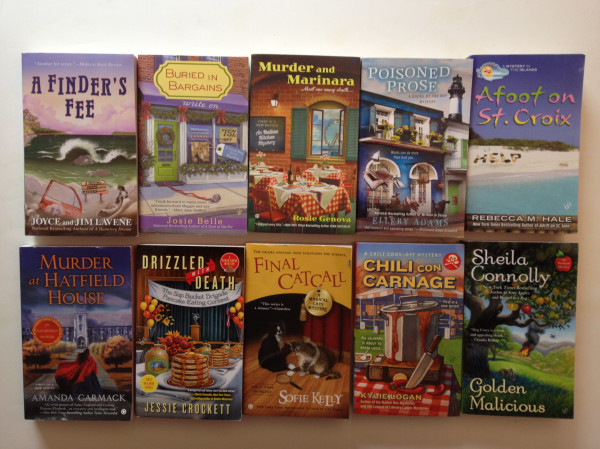
autumn mailbag roulette : cats, dog, bunny, pancakes, orchards, & Chili con Carnage
— — — —
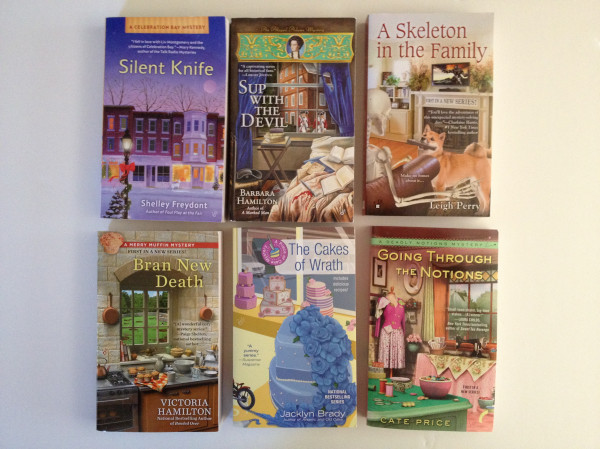
end of summer mailbag roulette : cakes and bran ; includes delicious recipes
— — — —
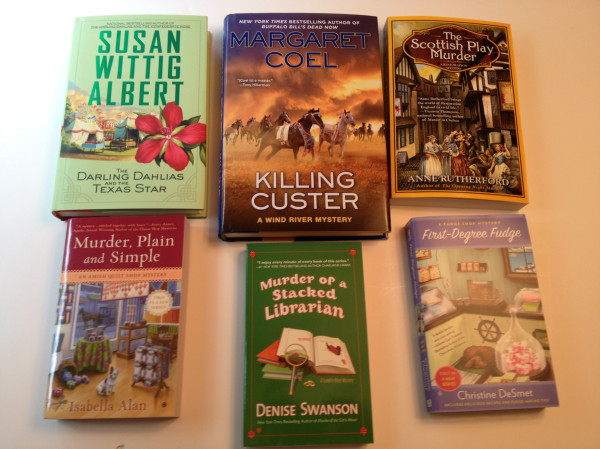
mailbag roulette mid-August : Murder of a Stacked Librarian
— — — —
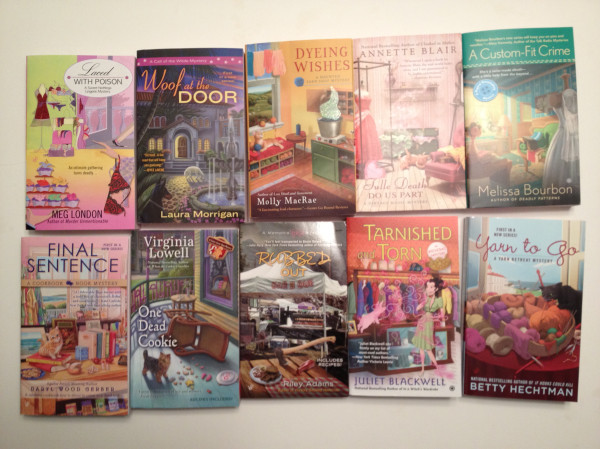
mailbag roulette (mid-June) : lace, lingerie, yarn, tulle, cats, dogs, goat (!), & Woof at the Door
— — — —
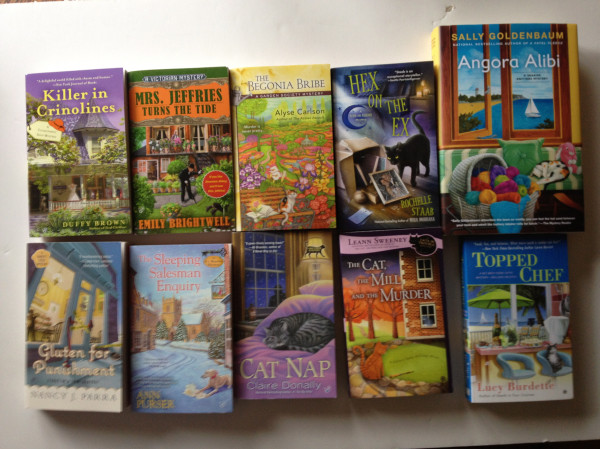
mailbag roulette : mid-April 2013 [N.B. : Cats 6, Dogs 1 ; Gluten for Punishment]
— — — —
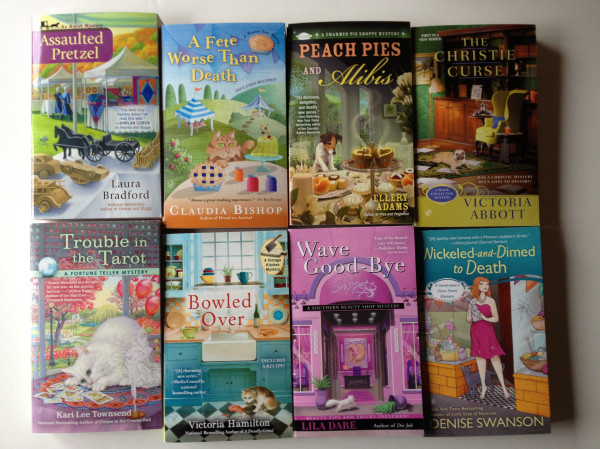
mailbag roulette, late Feb. : “by the author of Pies and Prejudice” (oh dear ; also note cats & dogs)
— — — —
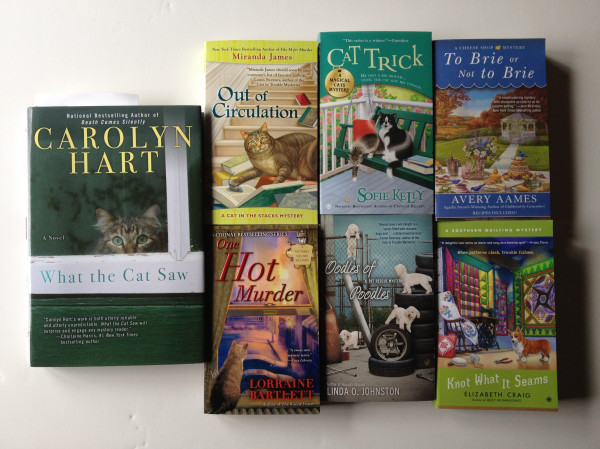
mailbag roulette, Jan. 2013 : cats, dogs, & Brie
— — — —
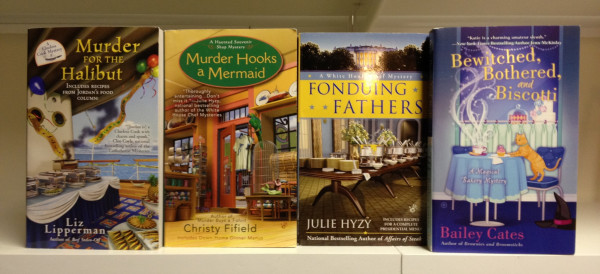
end of year mailbag roulette
— — — —
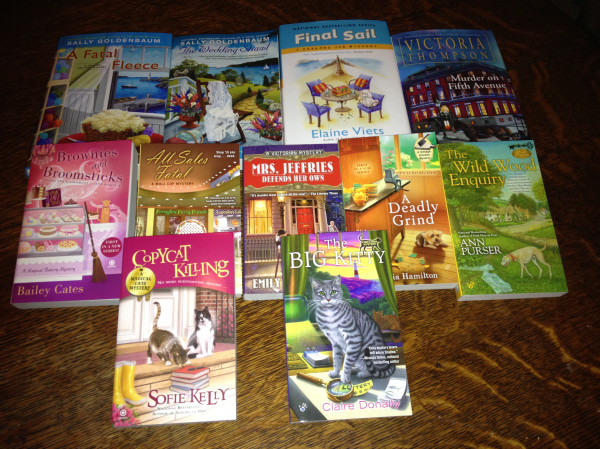
(mail bag) : WTF ! Who reads these books ? Who writes these books ? Why send them to me ?
The imminent disappearance of the Twitpic platform has prompted your correspondent to assemble the several posts headed Mailbag Roulette into a single chronology. And to declare an end to it.
— — — —
L’Atlantide
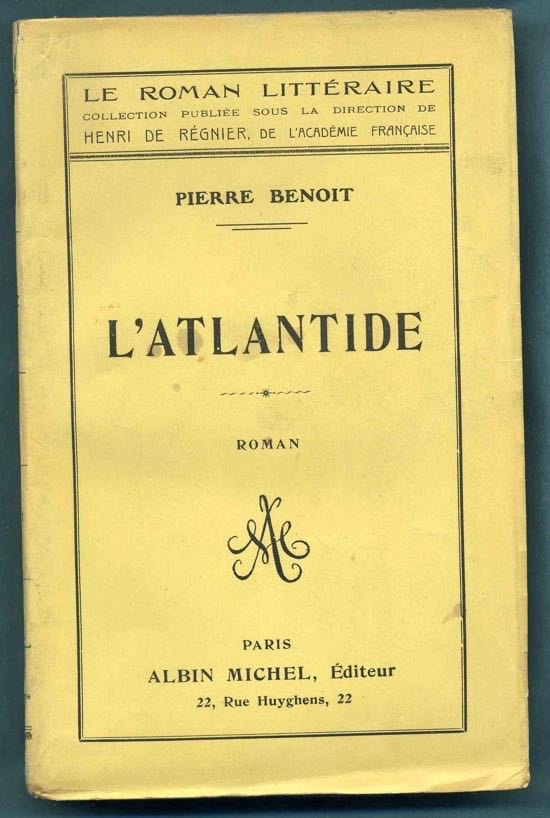
— Pierre Benoit. L’Atlantide. Roman. Albin Michel, [1919]. Re-read together with the 1920 translation by Mary C. Tongue and Mary Ross, for an essay, “ Fire-Flies in Atlantis, or, The Country of Fear ”, to appear in the autumn issue of Wormwood.
— — — —
This creaking and constantly evolving website of the endless bookshelf : I expect that some entries will be brief, others will take the form of more elaborate essays, and eventually I will become adept at incorporating comments or interactivity. Right now you’ll have to send links to me, dear readers. [HWW]
electronym : wessells
at aol dot com
Copyright © 2007-2014
Henry
Wessells and individual contributors.
Produced by Temporary
Culture, P.O.B. 43072, Upper Montclair, NJ 07043 USA.
